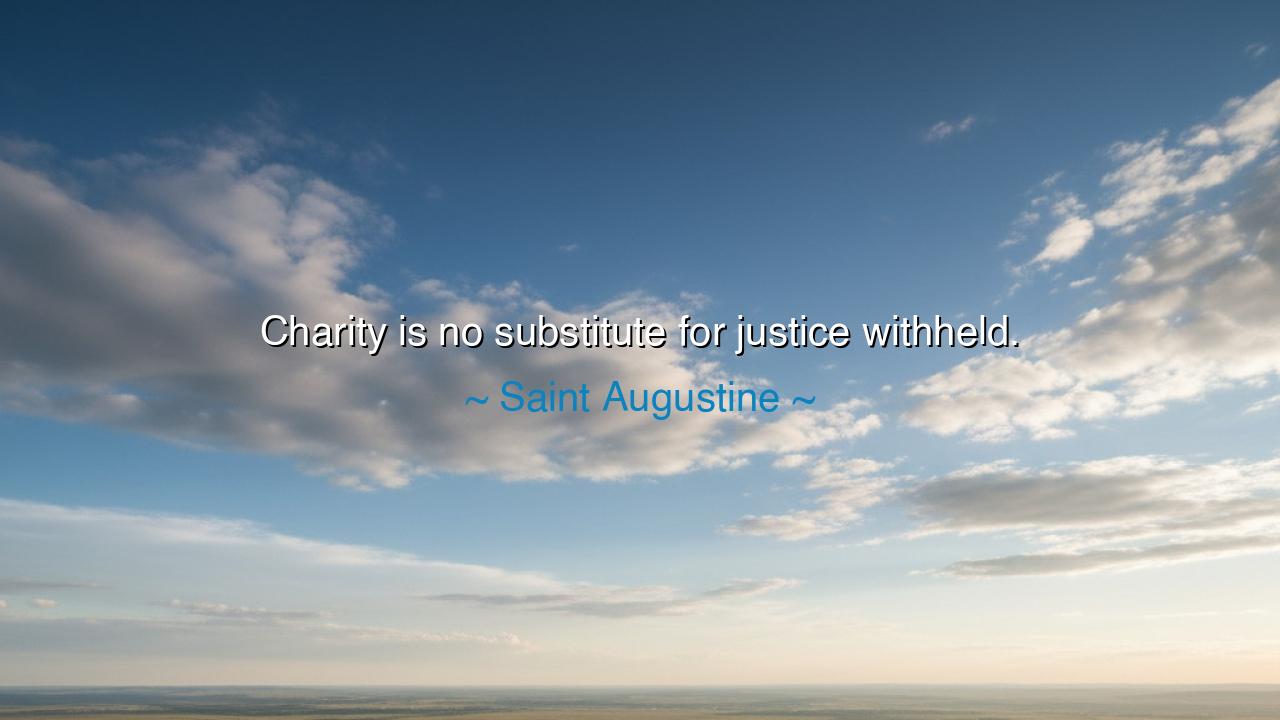
Charity is no substitute for justice withheld.






The words of Saint Augustine, “Charity is no substitute for justice withheld,” strike with the force of both tenderness and fire. They remind us that while acts of kindness and generosity are noble, they can never erase the deeper duty of fairness. Charity soothes the wound, but justice prevents the blow. To confuse the two is to mistake mercy for righteousness, and to cover oppression with a thin veil of benevolence. Augustine, the philosopher-bishop of the early Church, saw that true harmony in human affairs could not rest upon occasional gifts, but only upon the firm foundation of justice.
The origin of this saying lies in Augustine’s meditation on society, morality, and divine law. In his time, the Roman world was rife with inequality. The rich gave alms to the poor, but often continued to exploit them in law and labor. To Augustine, such a society was disordered: charity offered relief, yes, but it was relief built upon structures of injustice that remained untouched. He spoke these words to awaken the conscience of rulers, priests, and ordinary citizens alike—that without justice, charity becomes but a gesture, incapable of restoring the dignity of the oppressed.
History offers us countless examples of this truth. Consider the struggles of the American civil rights movement. For generations, African Americans were offered charity—small donations, occasional assistance, acts of kindness from individuals—but were denied justice in law, denied equality in voting, housing, education, and opportunity. It was not until the law itself was changed—when justice was no longer withheld—that the chains of segregation began to loosen. Charity fed the hungry for a day, but justice gave them the right to sit at the same table. Augustine’s wisdom lives in this history: no amount of charity can substitute for the denial of justice.
The deeper meaning of Augustine’s words is this: justice is structural, enduring, and owed, while charity is voluntary, fleeting, and optional. Charity depends on the will of the giver; justice belongs by right to the one who suffers. A beggar may survive on alms, but his dignity is restored only when society itself is ordered so that he need not beg. Augustine’s voice still cries out across centuries: let no one console themselves with generosity while perpetuating injustice.
And yet, his teaching does not scorn charity—it elevates it by placing it alongside justice. For charity is beautiful when it flows freely, not as a replacement, but as a companion to justice. When justice is secure, charity becomes an act of love, not a substitute for fairness. When justice is absent, charity risks becoming a mask, covering wounds without curing them. The noble task of humanity is to unite the two: to build a just society where dignity is guaranteed, and then to adorn it with compassion that flows beyond duty.
The lesson for us is urgent: do not let your heart rest satisfied with good deeds if you ignore the deeper inequities that cause suffering. Feed the hungry, yes—but also ask why they hunger. Clothe the naked, yes—but also labor to change the systems that leave them exposed. Give freely, but also act boldly to ensure that fairness is not withheld. Augustine’s wisdom calls us not only to kindness in the moment, but to courage in the shaping of society.
Therefore, let each of us live as both givers and guardians. Let us offer charity with open hands, but let us also pursue justice with steadfast hearts. Demand fairness in the workplace, equity in the courts, dignity in the laws. Support leaders who uphold the rights of all, not just the privileges of the few. And in your own life, wherever you see wrongs perpetuated, do not cover them with small gestures alone—strive to correct them.
So let Augustine’s words endure as a guiding flame: “Charity is no substitute for justice withheld.” They are not a rejection of mercy, but a call to root mercy in righteousness. For charity without justice is a bandage upon a festering wound, but justice with charity is the healing of the whole body of humanity. Let us then build a world where both dwell together, so that kindness may flow like a river, and justice may stand as its unshakable bedrock.






AAdministratorAdministrator
Welcome, honored guests. Please leave a comment, we will respond soon